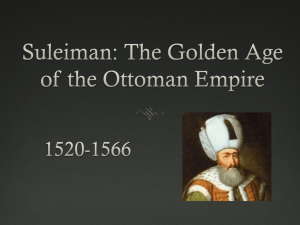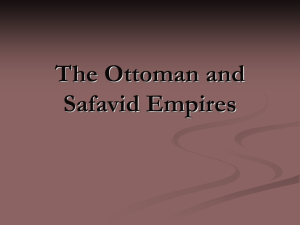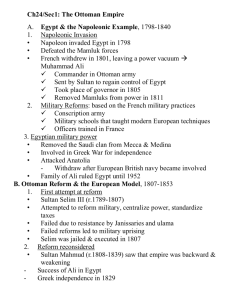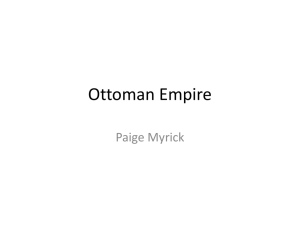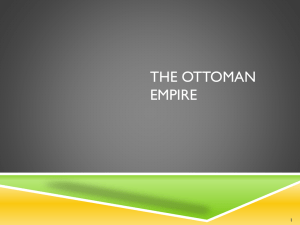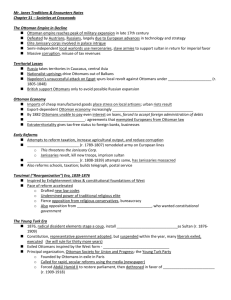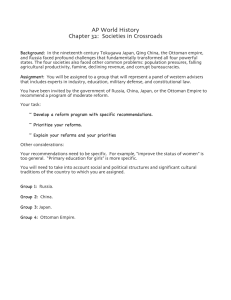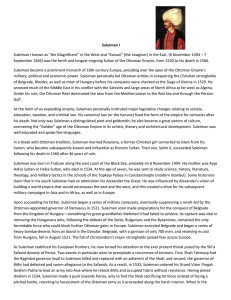Ottoman PowerPoint
advertisement
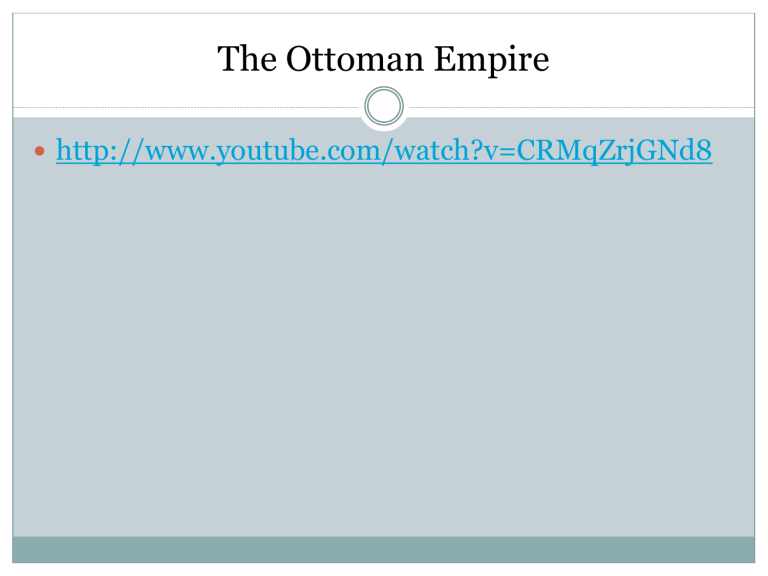
The Ottoman Empire http://www.youtube.com/watch?v=CRMqZrjGNd8 The Ottomans: 1299 - 1922 Does anyone know the story behind how the croissant pastry got its shape? The Ottomans: 1299 - 1922 During the Ottoman siege of Vienna in 1638, Viennese bakers discovered Turkish soldiers trying to tunnel beneath the walls. They alerted the defenders of the city, and the attempt was foiled. The siege soon ended. To celebrate their victory over the Turks, these bakers created pastries in the shape of the Turkish crescent, their national symbol! The Ottomans: 1299 - 1922 Ottoman Empire founded by Osman I, who ruled from 1280 to 1324. Osman I was a Ghazi. Ghazi: Islamic warriors who would conquer lands for plunder, glory, and to spread Islam Ghazis took control of old Seljuk territories, and expanded into Christian-held lands The Ottomans Osman I and his Ghazi Warriors Expansion Under their leader, Mehmet II, the Ottomans besiege and capture Constantinople. Constantinople is renamed Istanbul, and becomes the new capital of the Ottoman Empire. This is a serious blow, as well as a threat, to Christian Europe. Ottomans were the first to use large numbers of muskets and cannons, which gave them military and technological superiority Siege of Constantinople Expansion The Ottomans then begin to expand eastward into Muslim-controlled territory Selim the Grim comes to power in 1512 after murdering his father and brothers Selim was an effective Sultan and General Sultan: title of Ottoman rulers Expansion Selim captures Arabia, Palestine, Persia, Syria, and sections of Egypt. Captures the holy cities of Mecca and Medina Ottomans now control much of the territory of the original Umayyad and Abbassid Caliphates Turkish Sultans would later take the title of caliph, giving them religious authority Ottoman Expansion Suleyman the Magnificent Ottoman Empire reaches its height under Selim’s son, Suleiman. Suleiman rules for 46 years, from 1520 to 1566 Suleyman the Magnificent His was sometimes called Suleiman the Lawgiver or Suleiman the Magnificent. Suleiman was also a great general. His armies conquered much of southern Europe (The Balkans) and North Africa Expansion is finally stopped when he lays siege to Vienna, but fails to capture it. Siege of Vienna: 1525 Achievements of Suleiman Suleiman earns title of Lawgiver because he simplified the laws of the empire. Promoted science and architecture His chief architect constructed many beautiful schools, libraries, mosques, and bridges Ottoman Empire under Suleiman had an efficient civil service Suleiman Mosque Mostar Bridge Civil Service and Social Structure Devshirme Practice of taking Christian boys between 10-20 years of age, forcibly converting them to Islam, and training them for positions in either: a) military – “Men of the Sword” b) civil service – “Men of the Pen” Civil Service and Social Structure Janissaries Christian slaves captured during warfare who were trained as elite infantry in the Ottoman military Vizier High-ranking advisor to the Sultan. Often came from the devshirme system Civil Service and Social Structure Millets Provinces of the empire were allowed their own local government. Non-Muslim communities were loyal to sultan but were ruled by own religious leaders Included Jews, Armenians, Orthodox Christians Strengths of Ottoman Empire Strengths of Ottoman Empire 1. Control of Trade – controlled old Abbassid trade routes 2. Wealth – control of trade + taxation of provinces = great wealth 3. Military superiority – muskets, cannon, elite infantry and cavalry (Janissaries) 4. Political stability through millet system Ottoman-Safavid Rivalry Chief rival of the Ottoman Empire was the Safavid Empire, located in present-day Iran Safavids were Shi’ite Muslims Fought with the Ottomans for religious reasons, as well as control over Mesopotamia Safavids tried to topple Ottoman Sultans through palace intrigue Ottoman-Safavid Rivalry Decline of Ottomans Suleiman killed his oldest son Mustafa, who would have been an able successor His vizier, Ibrahim Pasha, was also assasinated by Suleiman’s wife His last son, Selim II, loses key battles to Europeans Selim allows bureaucracy to become corrupt Decline of Ottomans During the reign of Selim, the empire begins a slow, steady decline: 1. Europeans are able to sail around Africa, bypassing old trade routes 2. Wealth from New World (gold and silver) makes European powers rich 3. Industrial Revolution never takes place for the Ottomans Rise and Decline of Ottoman Empire http://highered.mcgraw- hill.com/sites/0073406937/student_view0/chapter 28/interactive_map_quiz.html

